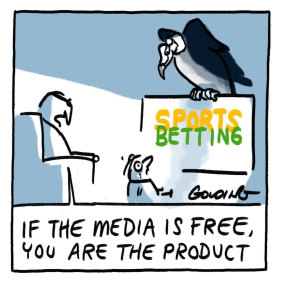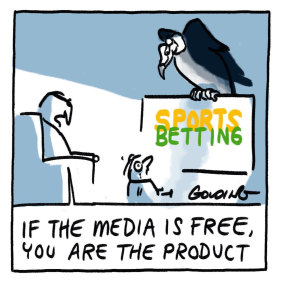Media companies will be given several years to scale back their reliance on advertising revenue from gambling firms in a federal move to soften the impact of a new cap on the promotion of sports betting, as the commercial broadcasters launch a last-minute push to stop a blanket ad ban.
The major broadcasters are warning of a cut to their $1.6 billion annual outlay on news, sport and local drama if the government imposes a tight cap on gambling advertising, raising the stakes in a cabinet decision as soon as next week.
Communications Minister Michelle Rowland defended her approach to the controversial policy in a fiery exchange in question time on Tuesday in which she attacked false claims from independent MP Zoe Daniel about the number of times the minister had met gambling executives.
With tempers flaring over the change, the government gave media industry chiefs until Wednesday to respond to the draft proposal and outline the likely loss of revenue, previously tipped to be about $240 million across television and radio if there were a total ban.
Finance Minister Katy Gallagher warned about the need to balance the gambling controls against the financial pressures on the media, after similar comments from Government Services Minister Bill Shorten and Employment Minister Murray Watt.
“I’m like any parent out there – I think we see too much gambling advertising,” Gallagher told the ABC on Tuesday afternoon. “So there has to be a response.”

Gambling ads before, during and after sport are a target for the ban.Credit: iStock
Gallagher, added, however, that the media was suffering from pressure on advertising revenue.
“This government does have a very strong interest in making sure that we maintain a level of public interest journalism, free-to-air regional coverage across Australia,” she said.
Shorten warned on the ABC’s Q+A program on Monday night that the broadcasters were in “diabolical trouble” and said he was not convinced a complete ban on gambling advertising would work.
In the third sign of concern about the impact on the media, Watt said on Tuesday that the government needed to balance the gambling concerns with the reality that advertising was an important source of revenue for free-to-air TV.
Free TV chief Bridget Fair said on Tuesday that the broadcasters spent $1.6 billion a year on their content and this would be put at risk by an ad ban. At the same time, the companies have to pay federal imposts including a $46 million annual tax to use broadcasting spectrum.
But the chief advocate for the Alliance for Gambling Reform, Tim Costello, said countries such as Spain and Italy had stopped gambling advertising without financial havoc because broadcasters had found other advertisers.
“The industry is crying wolf – it is as logical as calling for the return of tobacco advertising,” he said.

Credit: Matt Golding
Prime Minister Anthony Albanese is being urged to impose a total ban on gambling advertising to keep faith with former Labor MP Peta Murphy, who died last December after leading a bipartisan committee that said a partial ban would not work.
The ban is publicly backed by Labor MPs Mike Freelander and Maria Vamvakinou, Liberal MP Keith Wolahan and Nationals MP Pat Conaghan.
On Tuesday Jenny Ware became the latest Liberal MP to back a full ban.“I cannot understand why the minister and the Labor government prevaricate on the report after 14 months,” she said.
The federal cabinet plan centres on a partial ban using a cap of two gambling ads per hour on each channel until 10pm as well as a ban on the ads for an hour before and after a live sports event, as revealed by this masthead last week. This would begin in 2026.
A total ban on gambling advertising in media would also hurt wealthy sports whose primary revenue stream comes from selling their broadcast rights.
According to industry sources, such a move could lead to as much as 10 to 15 per cent being stripped off the value of future rights packages.
Most affected would be the two major football codes, the National Rugby League and the Australian Football League, which also each draw upwards of $50 million a year in product fees and sponsorship from betting agencies.
The NRL has a $2 billion, five-year contract with Foxtel and Nine (owner of this masthead) that runs until 2027. The AFL’s record $4.5 billion, seven-year deal with Foxtel and Seven West Media starts in 2025.
Both are not believed to contain clawback clauses that would allow the media companies to readjust them because of incoming gambling advertising restrictions.
The sports, which are also making final submissions to the government, warn that an outright ban on betting promotion would hurt the games at the grassroots level.
Cut through the noise of federal politics with news, views and expert analysis. Subscribers can sign up to our weekly Inside Politics newsletter.
